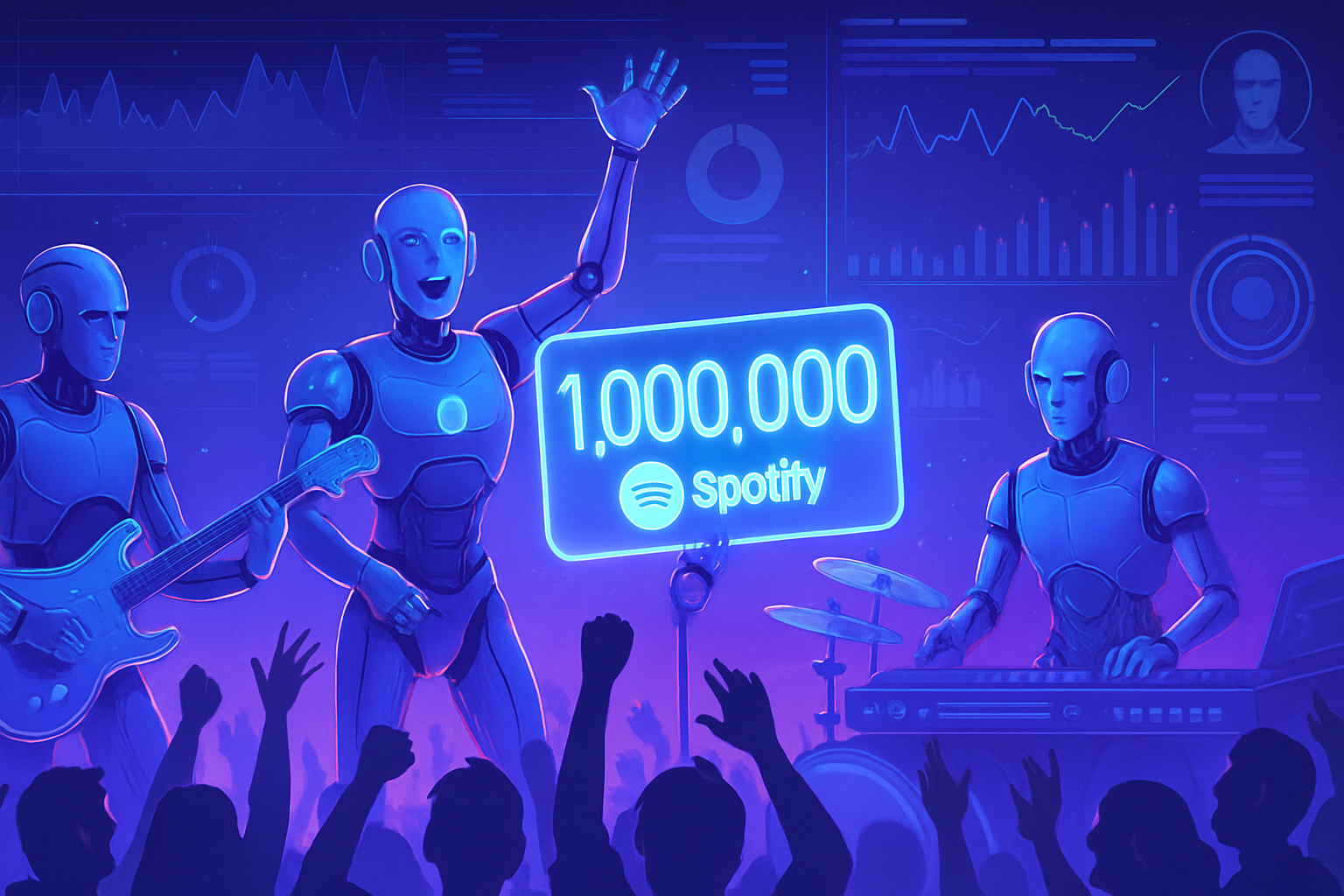An AI-generated music group has reached 1 million streams on Spotify. This news has caused a shockwave within the music industry, highlighting the *challenges of authenticity* and *transparency*. Experts question the implications of this technological advancement on human creativity, calling for clear labels for AI-generated content. The rise of such groups underscores the need for strict regulation to ensure rights for all creators. Listeners must be informed about the origin of the songs they consume.
Resounding success of an AI group
The musical phenomenon Velvet Sundown, an AI-generated group, recently surpassed 1 million streams on Spotify in just a few weeks. The meteoric success of this project has emerged in the music sphere, raising questions about its authenticity.
Debate on authenticity
Professionals in the music industry are questioning the transparency surrounding AI groups. Streaming platforms, such as Spotify, are currently not subject to legal obligations to clearly identify music generated by algorithms. This situation leaves listeners in the dark about the origin of the songs they listen to.
Revelations about musical creation
Initially, the group described itself as a synthetic music project led by human creators, denying any connection with AI. In June, they released two albums titled Floating On Echoes and Dust And Silence, which evoke the folk country style of Crosby, Stills, Nash & Young.
The controversy intensified when an individual, claiming to be an “adjunct” member, told the press that the songs of Velvet Sundown were created using an AI program named Suno. This project was then referred to by some as an art hoax.
Reactions from industry stakeholders
For Roberto Neri, director of the Ivors Academy, the situation where groups like Velvet Sundown reach a wide audience without true creators raises serious concerns. The lack of clarity opens the door to potential abuses regarding copyright and ethics.
Sophie Jones, head of strategy at the British Phonographic Industry (BPI), also expressed her support for clear labeling. She states that AI should support human creativity rather than replace it.
Possible exploitation of independent artists
The presence of AI groups could have negative repercussions for independent artists. According to Liz Pelly, author of Mood Machine, there is a risk of exploitation by the entities behind these projects. Previously, a song that used AI-generated vocals impersonating The Weeknd and Drake was quickly removed from platforms.
This dynamic raises a fundamental question regarding the protection of artists from the exploitation of their work by AI models.
Urgency for a legal framework
The dilemma surrounding the use of AI in music requires urgent attention. Commentators like Neri have highlighted the need for a robust legal framework. Safeguards must be put in place to ensure consent from creators and fair remuneration in this field.
Technology giants must also demonstrate transparency regarding their AI training practices, often without permission from original creators.
Initiatives from streaming platforms
Aurélien Hérault from Deezer announced that their service uses detection software to identify AI-generated songs. Hérault emphasizes the importance of informing users about the origin of these songs during a phase of “naturalizing AI”.
Currently, Spotify does not label AI-generated music, sparking criticism about the presence of “ghost artists” on some playlists. A Spotify spokesperson stated that all music on their platform is held by authorized third parties.
An uncertain future for the music industry
The case of Velvet Sundown represents an intriguing evolution in modern music, where AI is increasingly integrated into the creative process. The interactions between technology and human creativity continue to evolve, pushing the industry to reconsider its standards and practices in light of this new reality.
Frequently asked questions
What is the AI-generated music group, Velvet Sundown?
Velvet Sundown is a music group described as a synthetic music project, whose songs and visuals are entirely created by artificial intelligence, without human intervention in their creation.
How did Velvet Sundown reach 1 million streams on Spotify?
The group quickly accumulated over a million streams thanks to its online promotion strategy and a musical style inspired by iconic bands like Crosby, Stills, Nash & Young.
Why is the authenticity of AI-generated music being questioned?
Experts are concerned about the lack of transparency regarding the origin of the songs, emphasizing that listeners may be misled into thinking that the music is created by AI, without human creators behind it.
Should streaming platforms label AI-generated music?
Yes, many experts are calling on streaming platforms like Spotify to clearly label music created by AI so that consumers are aware of the origin of the songs they listen to.
What are the risks for independent artists with the emergence of AI-generated music?
Independent artists may face exploitation risks, as AI projects could use their music to train models without permission, resulting in potential loss of financial compensation.
How will music companies manage the use of AI in musical creation?
Initiatives are underway to establish legal frameworks that protect copyright rights and ensure fair compensation for creators, as well as clear labeling on AI-generated content.
What actions do experts recommend for using AI ethically in music?
Experts stress the need to implement ethical practices that ensure consent from original creators and transparency in the use of AI in musical creation.
Should listeners be concerned about the absence of regulation for AI-generated music?
Yes, the absence of regulation can lead to abuses, knowing that large tech companies may exploit creative works without adequate compensation for artists.






